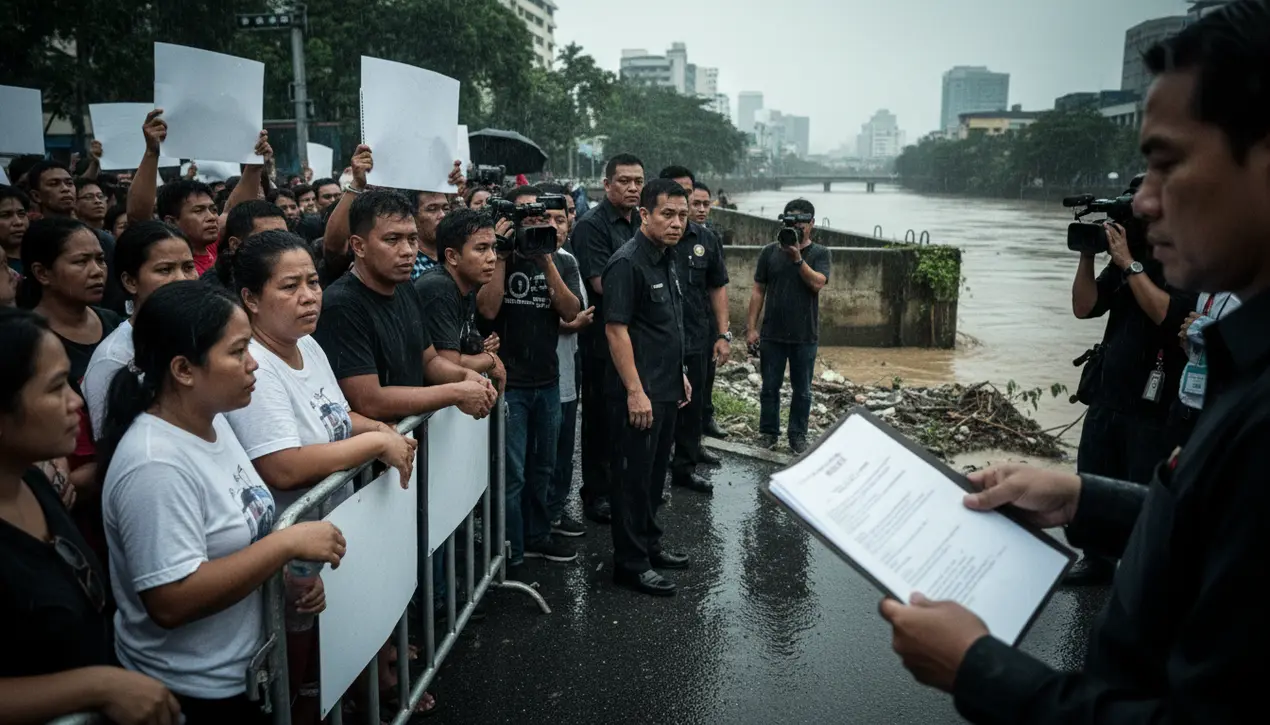
Politicscourts & investigationsCorruption Investigations
Philippine Officials Charged in Flood Control Corruption Scandal.
OL
Oliver Scott
1 hour ago7 min read1 comments
In a decisive legal maneuver that signals a significant escalation in the Philippine government's anti-corruption campaign, prosecutors formally filed the first criminal charges on Tuesday in a sprawling scandal involving fraudulent flood control projects, with officials vowing that this initial indictment merely opens the floodgates for 'many' more to come. This case, which has already ignited public fury and spurred street protests, centers on the systematic creation of 'ghost infrastructure'—phantom public works projects that were funded, approved, and documented on paper but never materialized in reality, believed to have siphoned billions of dollars from the national treasury over an extended period.The scandal was thrust into the political spotlight by President Ferdinand Marcos Jnr himself during a pivotal July address, where he connected the dots between these corrupt schemes and the weeks of deadly, paralyzing flooding that had plagued the nation, framing the misappropriation not merely as theft but as a direct threat to public safety and national resilience. The initial charges target a specific cohort of mid-level officials within the Department of Public Works and Highways, accused of conspiracy, graft, and falsification of public documents for allegedly certifying the completion of non-existent drainage systems and river wall reinforcements in the Cagayan Valley region, an area repeatedly devastated by typhoons.However, risk analysts following the case anticipate a domino effect; the charging documents are expected to serve as a template for subsequent actions against a wider network that potentially includes local governors, mayors, and private construction firms implicated in a sophisticated kickback operation. The modus operandi, as detailed in preliminary audit reports, involved inflating project costs, forging contractor signatures, and fabricating entire progress reports and completion certificates, with funds then being laundered through a complex web of shell companies and funneled into political war chests.This scandal presents a critical test for the Marcos administration, which has staked its credibility on a platform of bureaucratic cleansing and infrastructure development, yet now must navigate the perilous waters of prosecuting powerful political allies and entrenched interests without triggering a governmental crisis. The public response has been one of visceral anger, with citizen watchdog groups and grassroots organizations organizing daily vigils outside the Office of the Ombudsman, demanding not just accountability but comprehensive reforms to a procurement system long seen as riddled with cronyism.From a geopolitical risk perspective, the outcome of this prosecution will be closely monitored by international financial institutions and foreign investors, as a successful crackdown could enhance the Philippines' governance scores and unlock further development aid, while a perceived whitewash would severely damage investor confidence and exacerbate capital flight. Historically, the Philippines has seen similar large-scale corruption cases, such as the Priority Development Assistance Fund (PDAF) scam, which ultimately fizzled with few high-profile convictions, creating a pervasive culture of impunity that this current administration must now actively dismantle.The strategic calculus for prosecutors involves a careful, phased approach: starting with legally airtight cases against lower-level actors to build pressure and secure testimony before moving up the chain of command, a tactic reminiscent of successful anti-corruption drives in other Southeast Asian nations. The long-term consequences are multifaceted; beyond the immediate political fallout, there is the tangible impact on climate adaptation, as the stolen funds were earmarked for critical infrastructure meant to protect vulnerable coastal and riverside communities from the increasingly severe weather events driven by climate change, thereby compounding the human and economic toll of natural disasters. As the judicial process unfolds, the central question remains whether this marks a genuine turning point in the nation's fight against systemic graft or merely another chapter in its long history of corruption scandals that generate headlines but little substantive change.
#corruption
#ghost projects
#Philippines
#flood control
#government scandal
#lead focus news
Stay Informed. Act Smarter.
Get weekly highlights, major headlines, and expert insights — then put your knowledge to work in our live prediction markets.
Comments
Loading comments...
© 2025 Outpoll Service LTD. All rights reserved.